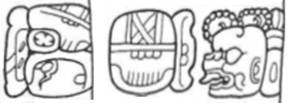


K&L.p32.#6.2 = BMM9.p15.r2.c4 K&L.p32.#6.1 TOK.p29.r2.c3 25EMC.pdfp52.#6.1&2&3 = K&L.p32.#6.2&1&3
YOPAT YOPAT YOPAT YOPAAT


K&L.p32.#6.3 mayavase.com
K4669 A6
YOPAT <CHAN:na>.<YOPAAT:ta>

Schele
CPN Altar Q F3-F4
YAX.PAS{aj} CHAN.na YOPAAT.ti



Looper Looper Looper
QRG Stela A C7 QRG Stela D A18 QRG Stela E C19
YOPAAT K’AHK’.<TIL{iw}:CHAN>.YOPAAT <K’AHK’:TIL{iw}:CHAN>.<YOPAAT>
![]()

![]()
Looper Looper Looper
QRG Stela F 14a QRG Stela F D12 QRG Stela J C13
yo.<<YOPAAT+AAT>:ti> <yo:YOPAAT>.CH’AHOOM YOPAAT
/ yo.<YOPAAT:AAT>:ti>

Looper
QRG Stela K C7-D7
<K’AHK’.<ho[lo]>>.<ya:CHAN:na> <<yo.<YOPAAT+AAT>>:ti>.<<K’UH{ul}.“TOL”>:AJAW:wa>
· No glyphs given in K&H.
· 25EMC.p32.#6 gives that the pronunciation can be either Yopaat or Yopat (perhaps because of the end phonetic complements ti and ta). This is probably due to the shortening of long vowels towards the end of the Late Classic.
· Variants (1):
o A. god head – features:
§ Left:
· (Optionally) The head topped by 2 or 3 left feelers (each with its own “dotted protector”). This resembles the reduced variant of to.
· A reptilian/bird head, with a distinct “beak”.
§ Right:
· An arm with the hand grasping either a plain rock (KAWAK) or a stone blade. The weapon has no handle – the hand directly grasps the blade, which has a slot in it the centre, made for the purpose of being able to hold it).
There can be an optional phonetic complement ti/ta– where the three god heads Chaak, K’awiil, Yopaat can sometimes be difficult to tell apart, the (occasional) phonetic complements of (respectively) ki, la, ti/ta can be helpful.
· K4669 A6:
o On the right, the expected arm with a weapon in the hand seems to be absent and there appears to be a “spondylus shell ear” instead (characteristic of Chaak). However, the ta at the bottom and the three “to” scrolls above confirm that YOPAAT is intended.
o The ta instead of the expected ti might be because of the loss of long vowels at the end of the Late Classic. Most of the other examples above with end phonetic complement have ti.
· In QRG Stela E C19, the object held in the hand seems to be neither a plain rock nor a stone blade with a hole in it. Instead, it appears to be an axe, typically held in the hand of the glyph for KAL{oomte’}.
· In QRG Stela F A14a and QRG Stela K D7a, there are two ways of reading this arrangement of glyphs:
o The YOPAAT is a full head-variant, with two protected scrolls on top and a deity-head on the bottom. The deity-head is, however, obscured by the AAT, which comes between the viewer and the full head-variant of YOPAAT (here informally notated as a conflation of the two), leaving just the two protected scrolls to stick out above, from “behind” the AAT.
o The YOPAAT is a reduced (horizontally rectangular) variant consisting of just two protected scrolls. The AAT then comes directly below this reduced variant.